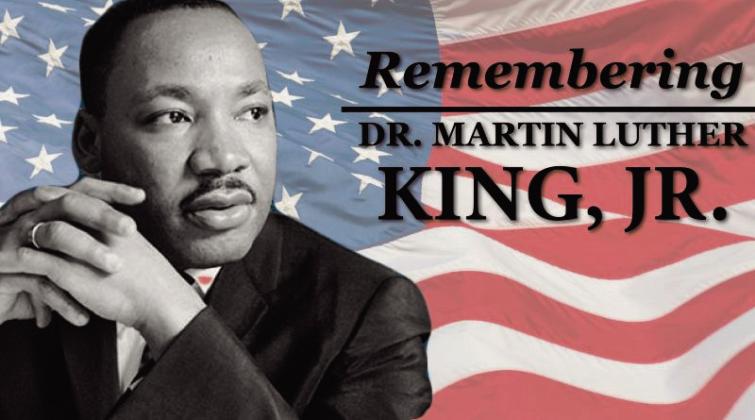“I have decided to stick with love, Hate is too great a burden to bear.”
King was an American Baptist minister and activist who became the most visible spokesman and leader in the American civil rights movement from 1955 until his assassination in 1968. King advanced civil rights through nonviolence and civil disobedience, inspired by his Christian beliefs and the nonviolent activism of Mahatma Gandhi. He was the son of early civil rights activist and minister Martin Luther King Sr.
King participated in and led marches for blacks' right to vote, desegregation, labor rights, and other basic civil rights. King led the 1955 Montgomery bus boycott and later became the first president of the Southern Christian Leadership Conference (SCLC). As president of the SCLC, he led the unsuccessful Albany Movement in Albany, Georgia, and helped organize some of the nonviolent 1963 protests in Birmingham, Alabama. King helped organize the 1963 March on Washington, where he delivered his 'I Have a Dream' speech on the steps of the Lincoln Memorial.
On October 14, 1964, at the age of 35, King won the Nobel Peace Prize for combating racial inequality through nonviolent resistance. In 1965, he helped organize two of the three Selma to Montgomery marches. In his final years, he expanded his focus to include opposition towards poverty, capitalism, and the Vietnam War.
In 1968, King was planning a national occupation of Washington, D.C., to be called the Poor People's Campaign, when he was assassinated on April 4 in Memphis, Tennessee. His death was followed by riots in many U.S. cities. Allegations that James Earl Ray, the man convicted of killing King, had been framed or acted in concert with government agents persisted for decades after the shooting. King was posthumously awarded the Presidential Medal of Freedom in 1977 and the Congressional Gold Medal in 2003. Martin Luther King Jr. Day was established as a holiday in cities and states throughout the United States beginning in 1971; the holiday was enacted at the federal level by legislation signed by President Ronald Reagan in 1986. Hundreds of streets in the U.S. have been renamed in his honor, and the most populous county in Washington State was rededicated for him. The Martin Luther King Jr. Memorial on the National Mall in Washington, D.C., was dedicated in 2011.
The Martin Luther King, Jr. Memorial is a national memorial located in West Potomac Park next to the National Mall in Washington, D.C., United States. It covers four acres and includes the Stone of Hope, a granite statue of Civil Rights Movement leader Martin Luther King Jr. carved by sculptor Lei Yixin. The inspiration for the memorial design is a line from King's 'I Have a Dream' speech: 'Out of the mountain of despair, a stone of hope.' The memorial opened to the public on August 22, 2011, after more than two decades of planning, fund-raising, and construction.
King was awaded the Presidential Medal of Freedom, an award bestowed by the president of the United States to recognize people who have made 'an especially meritorious contribution to the security or national interests of the United States, world peace, cultural or other significant public or private endeavors.' The Presidential Medal of Freedom and the Congressional Gold Medal are the highest civilian awards of the United States. The award is not limited to U.S. citizens and, while it is a civilian award, it can also be awarded to military personnel and worn on the uniform. It was established in 1963 by President John F. Kennedy, superseding the Medal of Freedom that was established by President Harry S. Truman in 1945 to honor civilian service during World War II.
The Martin Luther King, Jr. Memorial honors a man of conscience; the freedom movement of which he was a beacon; and his message of freedom, equality, justice and love.
Dr. Martin Luther King Jr. was a phenomenal leader and some of the traits that he possessed were intelligence, self-confidence, and determination. As a leader, being intelligent is very important within an organization because a leader is expected to know a lot.
During the less than 13 years of Dr. Martin Luther King, Jr.’s leadership of the modern American Civil Rights Movement, from December 1955 until April 4, 1968, African Americans achieved more genuine progress toward racial equality in America than the previous 350 years had produced. Dr. King is widely regarded as America’s pre-eminent advocate of nonviolence and one of the greatest nonviolent leaders in world history.
Coretta Scott King was an American author, activist, civil rights leader, and the wife of Martin Luther King Jr. As an advocate for African-American equality, she was a leader for the civil rights movement in the 1960s. King was also a singer who often incorporated music into her civil rights work.
In 1968, Dr. King’s wife, Coretta, officially founded the Martin Luther King, Jr. Center for Nonviolent Social Change, which she dedicated to being a “living memorial” aimed at continuing Dr. King’s work on important social ills around the world.
“Love is the only force capable of transforming an enemy into a friend.”
“I have a dream that one day my children live in a nation where they will not be judged by the color of their skin but by the content of their character.”
“In the end we will remember not the words of our enemies,but the silence of our

